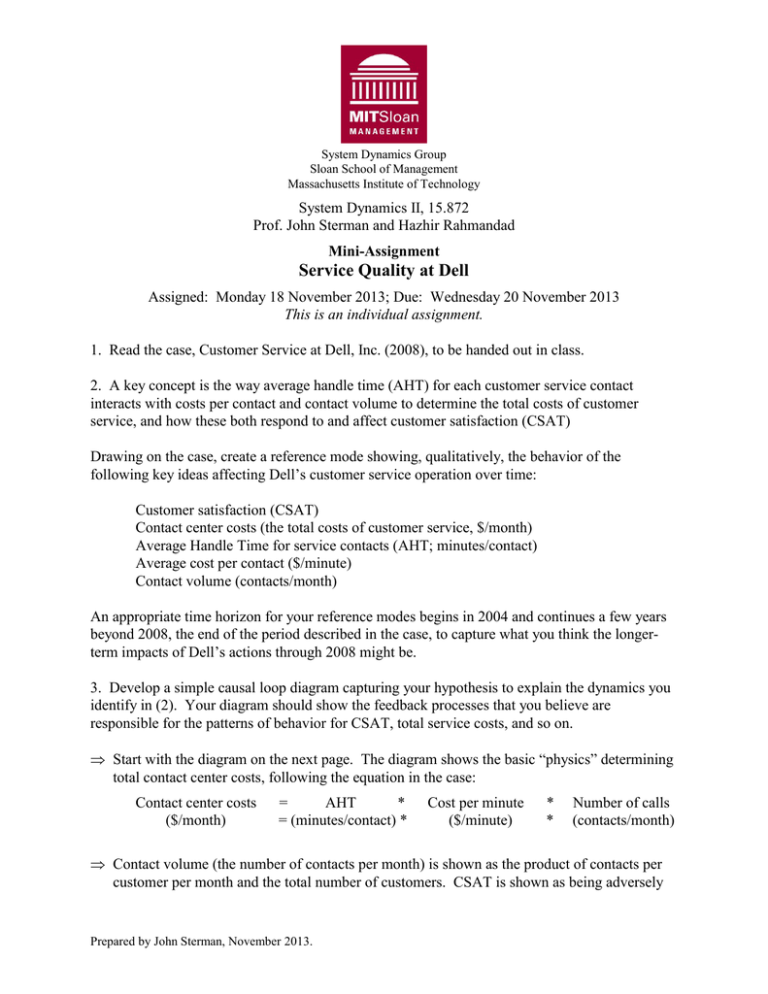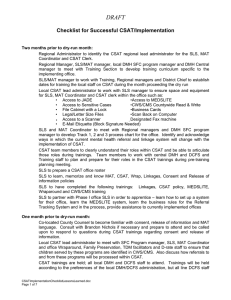Service Quality at Dell
advertisement

System Dynamics Group Sloan School of Management Massachusetts Institute of Technology System Dynamics II, 15.872 Prof. John Sterman and Hazhir Rahmandad Mini-Assignment Service Quality at Dell Assigned: Monday 18 November 2013; Due: Wednesday 20 November 2013 This is an individual assignment. 1. Read the case, Customer Service at Dell, Inc. (2008), to be handed out in class. 2. A key concept is the way average handle time (AHT) for each customer service contact interacts with costs per contact and contact volume to determine the total costs of customer service, and how these both respond to and affect customer satisfaction (CSAT) Drawing on the case, create a reference mode showing, qualitatively, the behavior of the following key ideas affecting Dell’s customer service operation over time: Customer satisfaction (CSAT) Contact center costs (the total costs of customer service, $/month) Average Handle Time for service contacts (AHT; minutes/contact) Average cost per contact ($/minute) Contact volume (contacts/month) An appropriate time horizon for your reference modes begins in 2004 and continues a few years beyond 2008, the end of the period described in the case, to capture what you think the longerterm impacts of Dell’s actions through 2008 might be. 3. Develop a simple causal loop diagram capturing your hypothesis to explain the dynamics you identify in (2). Your diagram should show the feedback processes that you believe are responsible for the patterns of behavior for CSAT, total service costs, and so on. Start with the diagram on the next page. The diagram shows the basic “physics” determining total contact center costs, following the equation in the case: Contact center costs ($/month) = AHT * = (minutes/contact) * Cost per minute ($/minute) * * Number of calls (contacts/month) Contact volume (the number of contacts per month) is shown as the product of contacts per customer per month and the total number of customers. CSAT is shown as being adversely Prepared by John Sterman, November 2013. 2 affected by contacts per customer: the more times a customer must contact Dell, the lower their satisfaction is likely to be. You may of course consider other determinants of CSAT. Note that the diagram contains no feedback loops. Build on the diagram by adding the determinants of the inputs, thus closing the feedback loops you believe are responsible for the dynamics in your reference mode. Average Handle Time (AHT) (min/contact) Costs per minute ($/min) Contacts per Customer (contacts/month/customer) + + Service Costs ($/month) + Contact Volume (contacts/month) + + Customers Customer Satisfaction (CSAT) - Follow the standard rules for causal diagrams (Business Dynamics, Ch. 5), including labeling the polarity of every link and loop, naming your loops, using variable names that are meaningful to people who work in the real system, showing important delays, etc. Include explicit stock and flow structure only if it is useful to explain the dynamics. Your diagram is not intended to be the basis for a simulation model. It is intended to communicate your theory to explain the dynamics of customer service at Dell. Keep your diagram simple. It must fit comfortably on a single page. Spend no more than about 2 hours or so on this assignment. Upload your write- up before class on Wednesday 11/20. Bring your diagrams to class on Wednesday. Have fun. MIT OpenCourseWare http://ocw.mit.edu 15.872 System Dynamics II Fall 2013 For information about citing these materials or our Terms of Use, visit: http://ocw.mit.edu/terms.

